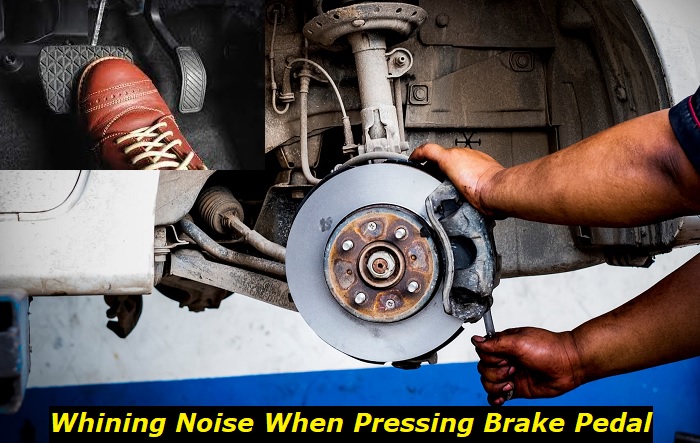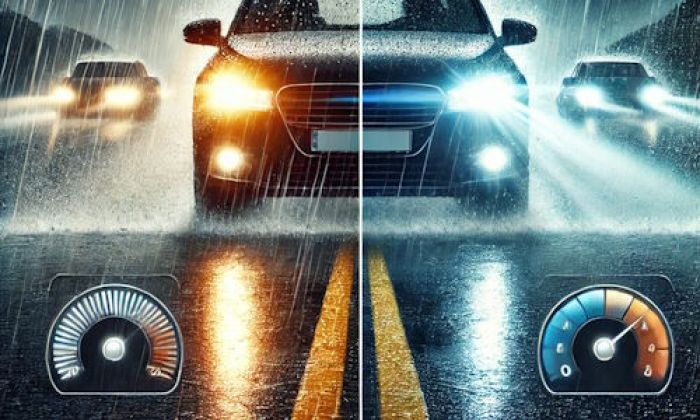Whining noise when pressing the brake pedal may occur because of hydroboost brakes issues, transmission problems, brake disc, and pads issues, and also several other reasons. Also, in older cars, the brake pedal itself may make some noises that are hard to locate. So, it's not always possible to find the problem without professional inspections.
Common brake problems highlights
- Level of urgency:super-urgent
- DIY diagnostics:possible but not recommended
- DIY repairs:impossible
- Price for repair:$150 - $450
- Common symptoms:issues with braking, car brakes on its own, brakes are inefficient, sounds when braking
- Commonreasons:fluid issues, caliper problems, cylinders problems, brake booster issues
- If ignored:no brakes, accidents, dangerous situations

What should you inspect on your own?
If your brakes are whining when you press the pedal, the worst thing you can do is ignore this. While it can be just a poor-quality brake pad and it will stop whining in a couple of days, this can also be a sign of a serious issue with your vehicle.
Fortunately, you can almost certainly say what exactly creates this noise by just analyzing its nature. You need to ask yourself several questions and carefully answer each of them to get a better understanding of what's happening with your car.
Here are the questions:
- Where do you hear this noise? If it's heard from the interior, this is most likely the pedal mounting. If you hear it from the wheels, you need to check the pads and rotors.
- What is the kind of whining noise? Low-pitched and deep noise may mean that there is a faulty bearing in the transmission. While the surface high-pitched noise will mean that the problem is not inside some mechanism.
- Is it consistent? If it appears every single time you press the pedal, this is a problem with the certain unit. But if the noise is not consistent, locating it may be even harder.
- What's the noise like? Whining can be different and you need to identify the nature of the noise. Does it sound like a bad bearing? Or does it resemble two metal parts scratching over each other?
After you answer these questions, it will be easier for you to understand where to look. Also, you may locate the actual source of the whining noise even before you understand what's going on with the car. When you know the source, it's much easier to locate the actual culprit of the noise and maybe even repair your car on your own.
Of course, if you still can't answer the questions and find the reason for the noise, it's a very good idea to go to a professional mechanic and have your vehicle inspected. Just ignoring the problem is not a good option, especially when it comes to brakes.
Why is power steering worth checking?
Whenever you hear a whining noise when you press the brake pedal, you need to check if your car has hydroboost brakes. This is the technology that takes power for the power brakes from the hydraulic system of power steering. So, this hydraulic system serves steering and brakes simultaneously.
For example, this is true for several types of Ford F-Series trucks, especially the heavy-duty ones.
If this is the case with your vehicle, then immediately check the fluid level. If it's OK but the power steering pump keeps whining when you press the brake pedal, you should immediately go to a good repair shop. The pump may be living its last days and you certainly don't want it to die when you are on the highway.
Can this be the transmission?
If the whining sound is very deep and low-pitched, this may be the transmission. It will usually whine significantly at a higher speed rather than at a lower one. There are several bearings in the transmission and while some of them are loaded when the engine is pulling the car forward, some others are loaded when you release the gas pedal and start braking.
If this is the case, such whining noise can be there in your car for ages. It can start with very silent whining and in a year or two grow into some unbearable sound that requires your attention.
Repairing this is not that easy because to replace the bad bearing, your mechanic will need to take the transmission off the car. While the bearing may not cost you a fortune, the labor is going to be pretty expensive.
What are some other reasons that are worth checking?
Among the reasons that may deserve your attention, there are about a dozen other things. I will only cover the most common ones. But you need to know that these are not the only possible things that may trigger whining noise in your car.
Here's what you should look at:
1) Pedal mounting
Your brake pedal is mounted in the pedal unit and after some time it can start whining just when you press it. It's easy to locate this issue but not that easy to solve.
If you decide to lubricate the mounting, be very careful. The grease may eventually appear on your shoes or pants. In most cases, it's worth going to a specialist and checking why the mounting is whining when the pedal is being pressed.
2) Seals in the partition
The brake pedal is moving a certain rod that pushes the brake cylinders. Actually, this rod goes through the partition between the passenger compartment and the engine bay. In this partition, there is a hole for this rod. And the hole is fitted with the seal. This seal may go bad and now the metal rod scratches the metal partition when moving.
This is an obvious reason but many drivers forget to check this when they are looking for the culprit of the annoying noise.
3) Rotors and pads
If the sound goes from the wheels, it's very likely that your pads are scratching the rotors when you try to brake. It means that the rotor may be damaged soon if you ignore the problem. Change the brake pads once they are thin without waiting for them to emit strange noises.
Also, check the ABS sensors that can get contaminated and make different kinds of sounds that you may dislike.
4) Something disturbs the calipers
You may have caught something in the caliper like a stone or a metal thing. Now, when you press the brake pedal, this thing disturbs the caliper from properly working and creates problems. Whining noise can appear when the brakes don't work as they are intended to. It's worth checking whether the caliper works well.
5) Brake cylinders
The cylinders on the wheels are very durable. But they are not eternal. If they start leaking, they may also produce some sounds while they are still working. This sound is not usually described as whining, but people perceive sounds differently, so you should also pay attention to the brake cylinders. Make sure they are dry and have no signs of leaks of brake fluid.
Can you drive if your brakes make a whining noise?
This is not a simple question to answer. Actually, you should be aware of what's happening with the car before you keep driving. Also, if the whining sound appears suddenly and is very loud, you shouldn't drive this car.
Please understand that this is a serious safety issue when it comes to the brakes. Here are the things you should do:
- stop the vehicle safely;
- try to inspect the car and look at the most obvious possible reasons;
- if you locate the issue, call your mechanic and ask if you can drive;
- if the issue is undetectable, you should check if the brakes and steering work well;
- you can keep driving carefully if the brakes are completely OK;
- drive at 10-15 MPH and keep to the right side of the road (left in the UK);
- visit the repair shop or dealership as soon as possible.
If you just ignore the issue and keep driving, you should understand that the vehicle will most likely fail soon. It may happen when you are on the highway, in the middle of nowhere, with no help that's going to come soon.
Final thoughts
Be careful when it comes to brakes. This is the golden rule you should always remember about. If you hear whining noises when pressing the brake pedal, it's not completely safe to drive your car further. At least, until you identify the reason for the problem.
It's important to find what's exactly whining in your car before things are too bad. In this article, I outlined several important reasons and you can use them to troubleshoot your car. But I strongly recommend going to a professional unless you perfectly know what you are doing.
If you have any questions, ask them in the comments below. Also, share your experience with us!
About the authors
The CarAraC research team is composed of seasoned auto mechanics and automotive industry professionals, including individuals with advanced degrees and certifications in their field. Our team members boast prestigious credentials, reflecting their extensive knowledge and skills. These qualifications include: IMI: Institute of the Motor Industry, ASE-Certified Master Automobile Technicians; Coventry University, Graduate of MA in Automotive Journalism; Politecnico di Torino, Italy, MS Automotive Engineering; Ss. Cyril and Methodius University in Skopje, Mechanical University in Skopje; TOC Automotive College; DHA Suffa University, Department of Mechanical Engineering






Add comment